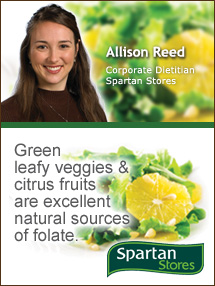The Fab Five Nutrients for Women

Over the course of a woman’s life, nutrition needs are constantly changing. Read on to learn more about the key vitamins and minerals to focus on, no matter what life stage you’re in.
Calcium & Vitamin D
Calcium is a vital mineral for building and maintaining strong, healthy bones. Vitamin D is needed for the body to absorb calcium. It is critical to get enough calcium and vitamin D while the body is growing and developing to build bones. Post menopause, the body is not as efficient at absorbing calcium and a woman is more likely to be diagnosed with osteoporosis – even with proper intake of vitamin D – if she does not increase calcium intake.
Dairy products such as milk (including lactose-free milk), yogurt, and cheese are the richest sources of calcium. Green leafy vegetables are also great natural sources of calcium. Many foods are fortified with calcium and vitamin D – cereal, fruit juices, tofu, and milk alternatives such as soy, rice, or almond milk.
Folate
It is necessary for a woman of childbearing age to have higher amounts of folate because her needs increase immediately prior to, and during pregnancy. Folate is a key nutrient needed to prevent birth defects of the brain and spinal cord. Adequate folate intake also helps to prevent anemia in pregnant women.
Green leafy vegetables, citrus fruits, and legumes such as dried beans and peas are all excellent natural sources of folate. Since the discovery of the link between folate and prevention of neural tube defects, the FDA has required folic acid (a synthetic form of folate) be added to enriched grain products such as flour, bread, cereal, rice, and pasta.
Iron & Vitamin C
Iron is a critical element in preventing anemia, transporting oxygen throughout the body, and building the blood supply of a growing baby. Females from the beginning to the end of menstruation have much higher iron needs than males. Pregnant women require over three times the amount of iron than men.
Clams, oysters, and organ meats are the top three sources of iron. The best plant-based food sources include beans, leafy greens, and fortified cereals. Vitamin C is necessary to help the body absorb iron that comes from non-meat sources. Citrus fruits, cantaloupe, strawberries, bell peppers, sweet potatoes, and broccoli are all excellent sources of vitamin C.
Life Stage: Amounts of Key Vitamins & Minerals Women Need
Life Stage
Females
1-3 yr
4-8 yr
9-13 yr
14-18 yr
19-30 yr
31-50 yr
51-70 yr
71+ yr
Pregnancy
14-18 yr
19-30 yr
31-50 yr
LactationCalcium
(mg/day)
700
1,000
1,300
1,300
1,000
1,000
1,200
1,200
1,300
1,000
1,000
1,300
1,000
1,000Vitamin D
(µg/day)
15
15
15
15
15
15
15
20
15
15
15
15
15
15Folate
(µg/day)
150
200
300
400
400
400
400
400
600
600
600
500
500
500Iron
(mg/day)
7
10
8
15
18
18
8
8
27
27
27
10
9
9Vitamin C
(mg/day)
15
25
45
65
75
75
75
75
80
85
85
115
120
120Derived from Dietary Reference Intakes set forth by the Food & Nutrition Board, Institute of Medicine, & National Academies
Recipe
Citrus Salmon & Lentil Salad
Yields 6 servings (1 cup)
Ingredients
Directions
Place lentils in a saucepan, cover with water and bring to a boil. Reduce heat to a simmer for about 30 minutes, or until lentils are tender. Drain and rinse with cold water. Meanwhile, mix lemon juice, dill, mustard, salt, and pepper in a large bowl. Gradually whisk in oil. Combine remaining ingredients and toss to coat with dressing.
Each serving of this recipe provides an excellent source of women’s fab five nutrients – calcium, vitamin D, folate, vitamin C, and iron. As an added bonus, it’s also high in protein, fiber, potassium, and selenium, and low in sodium.
Allison Reed, RD
Corporate Dietitian
Spartan Foods


